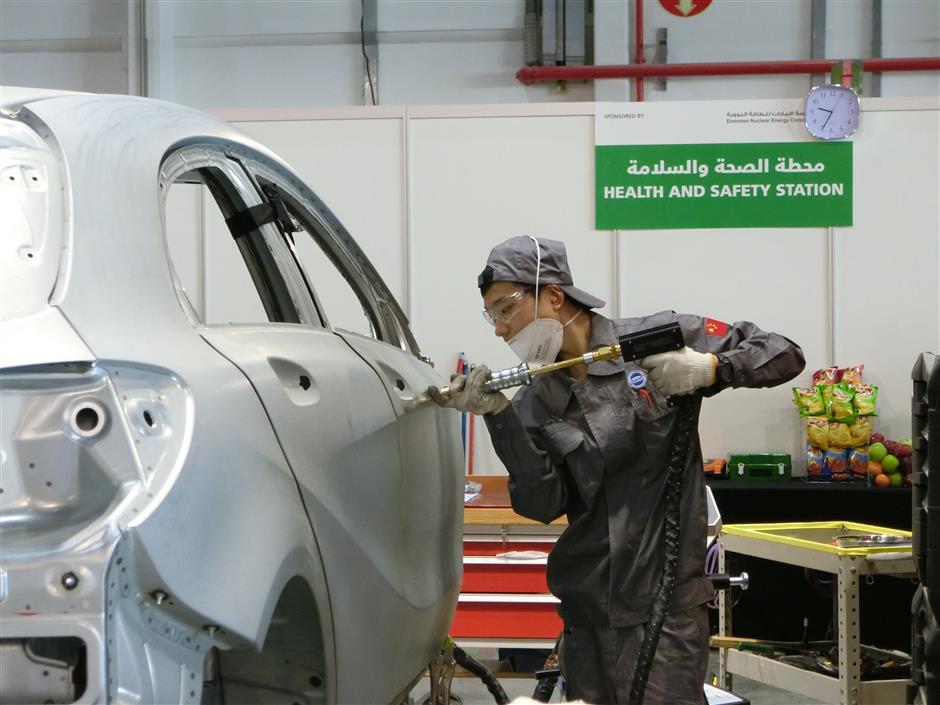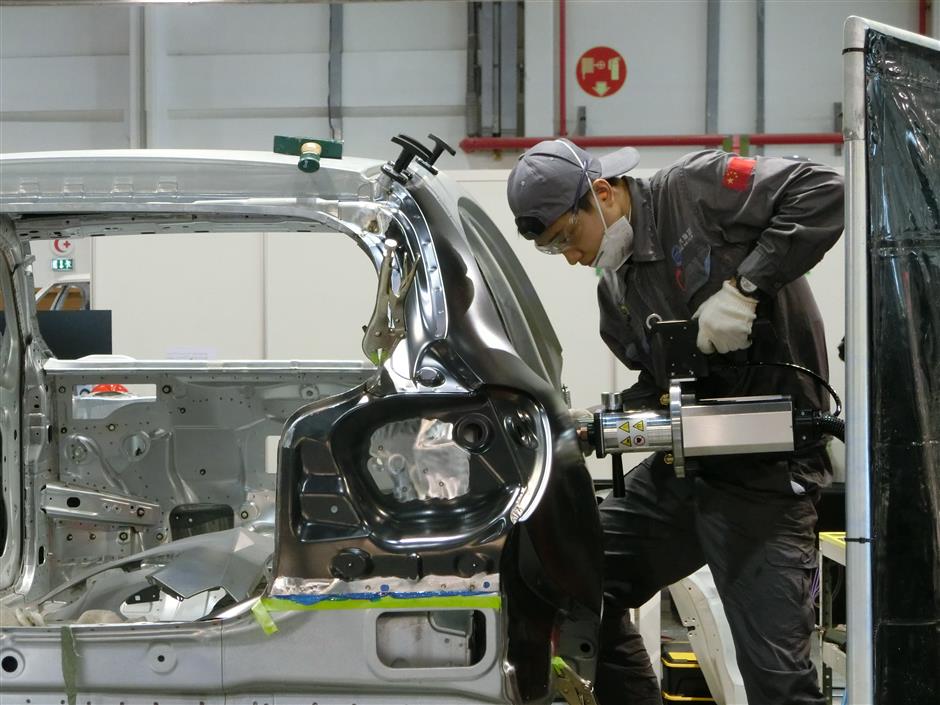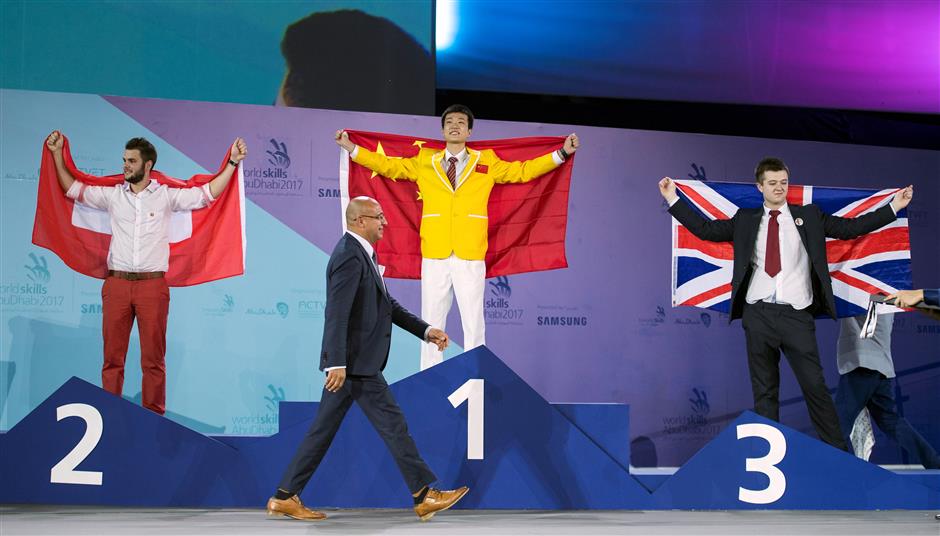Vocational school a golden opportunity for student

Yang Shanwei at the 44th WorldSkills Competition in Abu Dhabi

When Yang Shanwei, from Sichuan Province, graduated in June 2012 from the Jiuting Middle School in Shanghai where he lived with his parents working in the city, he faced a difficult choice. As he had no Shanghai hukou, or permanent residence permit, he would have to return to his hometown if he tried to attend high school.
If he wanted to remain in Shanghai, the only solution was vocational school. Then his father advised: “Why not learn some skill from a vocational school? It will help you earn a living in the future.”
So Yang enrolled at the Shanghai Yangpu Vocational and Technical School to learn about automobiles as he had loved model cars since he was a child.
It was a decision that paid dividends when Yang became the first Chinese to win gold in auto body repair at the 44th WorldSkills Competition in Abu Dhabi in October 2017.
Repair techniques, such as polishing, welding and cutting, may be considered boring, but Yang says he was amazed how they could make damaged auto parts like new.
He loved the specialty so much that he went to training centers set up by the school at a time when his classmates were playing after school.
Teachers soon noticed his curiosity, studiousness and outstanding performance and gave him extra training besides regular classes.
In June 2014, after only six months of training, he won a competition for vocational college students from all over the country.
Three months later, he became one of the eight candidates for the 43th WorldSkills Competition, together with three schoolmates.
They received intensive training and competed with each other to win a place in the international competition known as the “Olympic Games of vocational skills.”
He made to the final four, then the final two, but eventually lost out to classmate Luo Liang by less than a point.
But Yang did not give up. He continued his training and became a candidate for the 2017 competition.
Yang, now 21, graduated from the vocational school in 2015 and stayed on as a teacher.
He joined the national team in August 2016, getting up 6am and going to bed at 10pm every day. Besides auto body repair skills, he also needed to enhance physical training as the work required strength and the competition lasted three days.
“It was boring to repeat the practices day after day, not to mention that it was my second time to go through the process,” Yang says. “But the WorldSkills Competition was my dream and I just kept going.”
He endured the pain of sparks melting through his clothes during welding, scorching his skin and leaving burn marks on his arms and even feet.
“It hurt each time the spark dropped on me, but I told myself not to move because it would influence the accuracy of my work,” he says.

Yang Shanwei (right) waits for his turn at the competition.
Yang was extremely strict with himself, working to tolerances of 1 millimeter though the allowed error range was 2 millimeters.
Instead of using just his hands to feel the surface of repair work, Yan used a floodlight to check for smoothness.
His hard work paid off and he made it to the Abu Dhabi event.
The competition was particularly challenging. Previously, the organizing committee would release details of 70 percent of the tasks three months before the competition began so competitors had time to prepare. But this time the committee kept changing the contest content and added new tasks never included before.
One new task was to drill 60 holes in an automobile chassis. It was not easy as the chassis is the solidest part of the automobile and ordinary drills were useless. Students had to work in the limited space with a drill weighing more than 5 kilograms.
The training team turned to automotive and shipping companies for help and to locate bits made of high strength steel to solve the problem. During training, Yang managed to drill more than 100 holes in six hours, leading to strained muscles.
But all that effort made him well prepared in essential techniques and he won out with a 3-point advantage against the silver medal winner.
“When I heard the judge said ‘China’ out loud at the end of the competition and when I wore a national flag to receive the medal, I felt everything was worth it,” Yang says.
He attributed his success to the entire team, including coaches, experts, translators and other people.
He had particular praise for translator Han Ming whose specialty was in printing technology.
But a new practice meant the translators were distributed in a random draw.
The specialized vocabulary for auto body repair is different from that for printing, but Han learned quickly.
She also came to Yang’s rescue when he was almost eliminated from the competition.
The chief judge had mistaken Yang for someone who had written times of tasks finished on a Canadian competitor’s sheet, which was against the rules. Yang was suspected as CH had been written on the sheet. But Han was quick to point out that CH didn't mean China but was an abbreviation for Confoederatio Helvetica, or Switzerland.
Yang was awarded 500,000 yuan (US$) by the city government for his breakthrough winning. He joined the SAIC Motor last year.

For Yang Shanwei (center), everything was worth it when he wore the national flag to receive the gold medal.
















